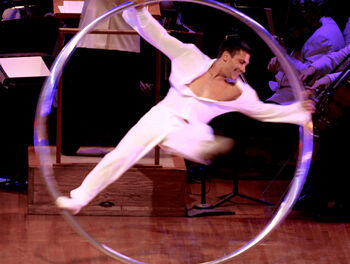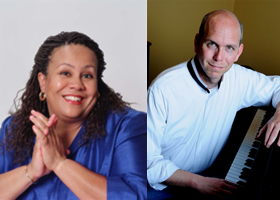The setting was The Cary Arts Center, that town’s refurbished school facility that’s about as fine a fine-arts venue as you’re likely to encounter. The Concert Singers of Cary (a top-notch ensemble opening their twenty-second season) and numerous guest musicians produced “Landscapes of American Music and Poetry,” celebrating American music and texts of strictly contemporary stripe. The majority of these offerings could be declared a grand success, a minority perhaps less so. Let us concentrate on the former.
But first, a few words of commendation on the extra-musical aspects of this afternoon presentation: Here was a program in which the texts were just as important as the music (but isn’t that usually the case?). The production was mightily enhanced by the inclusion of the relevant poetry in the well-prepared brochure. And the house lights were kept at such a level that one could actually follow along. May other program producers in the area seek to emulate these procedures.
Artistic Director Lawrence Speakman brought out the 27-voice Chamber Choir for the first two of the five song sets. Four Samuel Barber songs opened the afternoon, mostly in spare a cappella style. James Agee’s texts are always of high order: “Sure on this shining night / I weep for wonder / Wand’ring far alone / Of shadows on the stars.” Allen Bailey’s piano accompaniment was integral to “Under the Willow Tree” from Gian Carlo Menotti’s opera, Vanessa.
Composer John Corigliano has set to music the great poem, “Fern Hill,” from A Dylan Thomas Trilogy. Here the poet looks back upon an idyllic period in his young life, ultimately mourning his lost youth. “Time let me hail and climb / Golden in the heyday of his eyes, / … / Time held me green and dying / Though I sang in my chains like the sea.” Joining Bailey for orchestral accompaniment to this large work were violinists Yang Xi and Kim Hagan, violist Matthew Chicurel, cellist Jake Wenger and harpist Laura Byrne. These accomplished musicians added a powerful dimension to this moving number. Jami Rhodes lent a silky mezzo to the vocal proceedings at about the midpoint: “…it was lovely, the hay / Fields high as the house, the tunes from the chimneys, it was air / And playing, lovely and watery / And fire green as grass.”
The huge full chorus came on after intermission, over a hundred strong. For the song-set Afro-American Fragments by William Averitt (present at the concert), David Cole came over from the singing ranks to collaborate with Bailey on the piano accompaniment, more than mere accompaniment actually since the piano was so indispensable throughout the six Langston Hughes settings. The somber “Song for Billie Holiday” featured an obbligato by impressive soprano Diana Thompson, along with some of the most solid choral work of the afternoon. That same grand harmony was reprised in “Feet o’ Jesus.” Perhaps not so surprising, if “Fire!” had been assigned a formal movement designation, con fuoco would have served.
The three songs from prominent composer Libby Larsen’s The Settling Years depicted her version of the contemporary Ol’ West. “Comin’ to Town” was replete with whistling, yelling, stomping and yippy yah yaa. “Beneath Those Alien Stars” featured yet another excellent set of guest players, each instrument taking an appealing solo turn, to be answered by a companion. Doing the honors here were Allison Dimsdale (flute), Carrie Shull (oboe), Scott Moore (clarinet), Mary Burroughs (horn), Marian Graebert (bassoon) and Julia Thompson (percussion).
The René Clausen arrangement of “The Water Is Wide” produced perhaps the musical apex of the program. The choral quality was what one has come to expect from that composer. Adding greatly to the charm was the exquisite work of cello, clarinet and horn by the aforementioned players. This closing set brought forth three pieces by Craig Hella Johnson. It’s not exactly clear why this noted musician would have developed an interest in works by Carly Simon, Annie Lenox and Dolly Parton. But the overall effect was surprisingly uplifting. First-class mezzo-soprano (and Assistant Conductor) Jennifer Myers chimed in with a smoky solo in the Lenox song. And you had to give her credit for creating a pretty good Dolly Parton.












